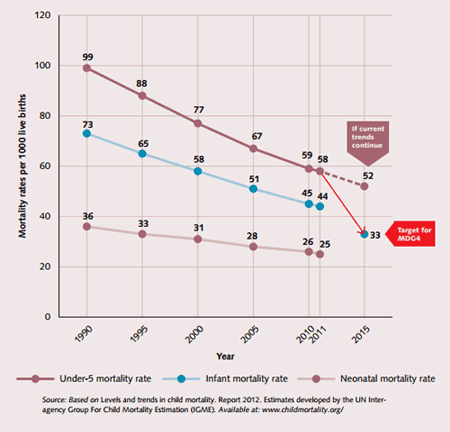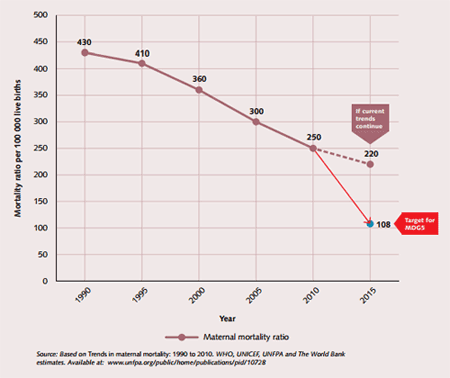Maternal, reproductive and child health
Over the past 20 years, the Region has made progress in addressing avoidable maternal and child deaths. Between 1990 and 2011, under-5 mortality declined in the Region by 41% (Figure 2). Maternal mortality declined by 42% between 1990 and 2010 (Figure 3). However, the problem remains substantial. It is estimated that 923 000 children under 5 years of age and around 39 000 women of childbearing age still die every year in the Region. Maternal and child death levels are particularly high in the poor, rural and underserved areas, among malnourished children and pregnant adolescents. While some countries have already achieved Millennium Development Goals 4 and 5, extensive efforts are still needed to accelerate the current average annual reduction rates of maternal mortality from 2.6% to 16.8% and child mortality from 2.5% to 14%, in order to achieve these goals in the Region by 2015.

Figure 2 Under-five mortality trends, including infant and neonatal mortality, 1990–2011 and extrapolation to 2015

Figure 3 Maternal mortality trend 1990–2010 and extrapolation to 2015
In the face of the unacceptable deaths affecting these vulnerable population groups, and while maternal and child health is said to be at the heart of development, current trends indicate that insufficient priority is being given by some countries to reducing this burden. In these countries low and inequitable access to maternal and child health care services remains an issue, together with high turnover of staff and lack of an integrated national plan for maternal and child health. Political instability, inadequate financial resources to increase coverage of effective interventions and lack of quality data for evidence-based programme management are contributing to the lack of adequate progress, particularly in countries experiencing humanitarian emergencies, violent conflicts and population displacement. In response, the Regional Committee endorsed maternal and child health as a strategic priority in the Region. The strategy adopted by the Regional Office is based on three elements: a special emphasis in WHO’s technical support on countries with a high burden of maternal and child mortality; focus on cost-effective, high impact interventions in primary health care; and strengthened partnerships. The latter means both a higher level of joint work between the WHO maternal and child health programmes and other programmes, such as health systems and control of communicable diseases including immunization, as well as special efforts to strengthen coordination and joint work with other partners, in particular UNICEF, UNFPA and other non-United Nations partners. A regional expert group on maternal and child health was established in September 2012 to support the Regional Office and Member States. This was followed by an expert group meeting outlining strategic directions for maternal and child health in the Region and supporting countries in developing acceleration work plans.
Much work was done towards year end in preparation for the high-level meeting on saving the lives of mothers and children in early 2013. The elements of country work plans were discussed and outlined using evidence-based cost-effective interventions to accelerate the reduction of maternal and child mortality. A technical workshop was conducted to further analyse existing gaps and challenges while sharing information and experiences on progress made in Millennium Development Goals 4 and 5 and in policy analysis of national maternal and child health policies of 10 priority countries with a high burden of maternal and child mortality: Afghanistan, Djibouti, Egypt, Iraq, Morocco, Pakistan, Somalia, South Sudan, Sudan, and Yemen. This workshop followed a “special envoy mission” to the priority countries to advocate for and mobilize action towards greater country commitment and active engagement in developing the acceleration plans.
The Regional Office also played an active role in initiating the activities of the Commission on Information and Accountability in the 10 priority countries. A regional workshop was organized in September 2012, in which the delegations of priority country took part. The workshop was followed by support provided to seven of these countries in holding national workshops that led to developing country roadmaps to strengthen national accountability and action for improving women’s and children’s health.
Since counselling is a key component of improving the quality of care and its impact on public health, the Regional Office, in collaboration with UNFPA, focused on developing regional and national teams of trainers in reproductive and maternal health counselling. Coverage with the strategy for Integrated Management of Child Health (IMCI) stands at 72% of primary health care facilities across 13 countries. The Regional Office continued to support assessment of the quality of teaching and student outcomes in medical schools which have introduced IMCI into their teaching programmes. An initiative on increasing the coverage of interventions has been introduced in some countries.
The challenge for 2013 is to finalize, launch and implement the acceleration plans to intensify action in order to achieve MDGs 4 and 5 before 2015.
Nutrition
The Regional Office has provided technical support for policy development and implementation of the regional strategy and action plan on nutrition in many countries. However, operational multisectoral food and nutrition policies and plans are lacking in most countries, and coordination between agricultural and health policies is generally weak. Management of severe malnutrition was introduced in three countries (Afghanistan, Pakistan and Yemen) through support for establishing more than 60 training and stabilization units in the main paediatric hospitals and health centres. The Regional Office, in collaboration with headquarters, supported regional capacity-building to introduce new WHO guidelines on management of severe malnutrition and to facilitate updating of relevant national protocols and action plans. The regional guidelines on wheat and maize flour fortification by vitamins and minerals were reviewed jointly with the Flour Fortification Initiative, the Global Alliance for Improved Nutrition (GAIN), Micronutrient Initiative, UNICEF and the World Food Programme to bring them into line with WHO recommendations. Advice was also given to some countries to strengthen nutrition surveillance systems.
Ageing and health of special groups
Member States generally face significant challenges relating to sustainable commitment to healthy ageing programmes, as well as gaps in the preparedness of health systems to respond to the increasing needs of ageing populations, and in the availability of well-trained health personnel with adequate expertise in this area. Still, some progress in technical collaboration with Member States was achieved in 2012.
Evaluation missions visited the Islamic Republic of Iran, Jordan and Syrian Arab Republic. The findings reflected some positive progress and commitment to strengthening policies and programmes. Age-friendly cities/communities initiatives generated support in three countries (Bahrain, Jordan and Syrian Arab Republic). An update of the Regional guide on health care of older persons for primary health care workers was prepared, in addition to a procedural guide and a facilitator’s guide. A regional electronic tool was designed to collect data on ageing and health. Several countries developed and updated their national strategies on active, healthy ageing and old age care. Saudi Arabia developed a national strategy document as well as updated guidelines on health care of older persons and Oman pioneered the design of a unique elderly care service programme.
Violence, injuries and disabilities
In 2012, WHO designated injury prevention as a priority programme in the Region, with specific focus on road traffic injuries and trauma care. A regional five-year plan (2012–2016) to reduce road traffic injuries was developed in collaboration with regional and international experts. The baseline for the Global status report on road safety 2013 was established by 19 countries. National road safety activities were documented in 13 countries using a regional tool, and regional capacity-building workshops were conducted in 16 countries for public health professionals in violence and injury prevention and injury epidemiology. Injury prevention was integrated into the public health, emergency medicine and nursing curricula. The regional framework for child and adolescent injury prevention was finalized and a child injury prevention module was included in the regional training package for community representatives and health volunteers.
The World report on disability was launched in Sudan with subsequent multisectoral training on coordinated implementation of the national disability strategy. Training on reporting on implementation of the Convention on the Rights of Persons with Disabilities was conducted in collaboration with the League of Arab States and other partners. In addition, a rapid assessment of rehabilitation services with special focus on assistive devices and prosthetics and orthotics was undertaken in Egypt and Tunisia.
Health promotion and education
In the area of health promotion, the Regional Office developed a tool to facilitate the development of national plans of action and involvement of multiple sectors. As part of WHO’s work on the International Health Regulations, the Regional Office, in collaboration with WHO headquarters and Indiana University, conducted a mapping of existing capacities in the area of risk communication during a health crisis and a draft framework on risk communications during a health crisis. The framework was developed to clarify the different core communication “nodes” that intervene during emergencies, and the needed coordination.
In collaboration with the Centers for Disease Control and Prevention, Atlanta and WHO headquarters, the Global School Health Survey was expanded to Iraq, Qatar and Sudan.
In the area of oral health, the Regional Office conducted an expert meeting to finalize a regional strategy on oral health promotion and a core set of oral health promotion indicators.
Social determinants of health and gender
WHO provided technical support to some countries in developing a plan and a set of actions on social determinants of health. A regional strategic plan to operationalize the Rio Political Declaration on Social Determinants of Health was developed and discussed in an intercountry workshop.
The healthy city programme expanded throughout the Region with implementation of the Urban Health Equity Assessment and Response Tool to identify health equity gaps and define policy responses. The Regional Office supported the Ministry of Health of Sudan in developing and field testing a training manual on managing disaster risks in communities for mobilizing community action and response in disaster risk reduction. A Regional Healthy City Network web site was launched in January 2012 to enable mayors and governors to register their cities and exchange their innovations and experiences.
Capacity-building was supported in Afghanistan, Iraq, Palestine, and Pakistan to support gender mainstreaming in public health and on health sector management and response to gender-based violence.


